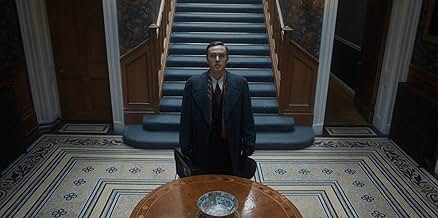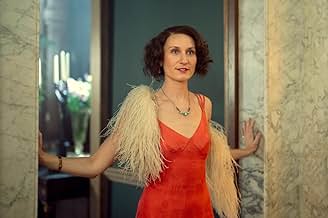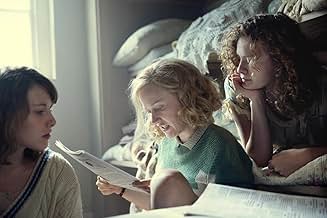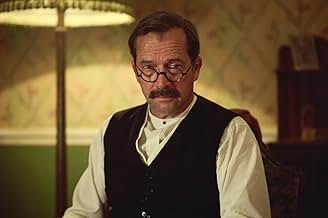Ajouter une intrigue dans votre langueBased on the story of the Mitford sisters, six sisters who refused to play by the rules and whose often-scandalous lives made headlines around the world. Set in the 1930s, it is a tale of be... Tout lireBased on the story of the Mitford sisters, six sisters who refused to play by the rules and whose often-scandalous lives made headlines around the world. Set in the 1930s, it is a tale of betrayal, scandal, heartache and even imprisonment.Based on the story of the Mitford sisters, six sisters who refused to play by the rules and whose often-scandalous lives made headlines around the world. Set in the 1930s, it is a tale of betrayal, scandal, heartache and even imprisonment.
Parcourir les épisodes
Avis en vedette
Ninety percent of the dialogue in this series is given over to exposition -- characters conveniently explaining things to one another, describing events we never get to see, or summarizing various plot developments -- and this strictly functional dialogue (along with Nancy Mitford's voice-over narration) has to do a great deal of work, since the series is filled with all manner of events, comings and goings, whirlwind romances, debutante balls, weddings, break-ups, divorces, financial crises, political allegiances, trips abroad, spats between siblings, reconciliations, etc. -- so the whole busy story with its multiple points of view, though handsomely mounted, feels somewhat artificial and contrived.
However, the acting is so good, by virtually all concerned, that the series is quite likable and a pleasure to watch. I particularly admired Bessie Carter as Nancy and Shannon Watson as Unity, but all the cast was excellent, including the actors (though the men in the series tend to be a fairly caddish and inadequate bunch).
However, the acting is so good, by virtually all concerned, that the series is quite likable and a pleasure to watch. I particularly admired Bessie Carter as Nancy and Shannon Watson as Unity, but all the cast was excellent, including the actors (though the men in the series tend to be a fairly caddish and inadequate bunch).
Let me get one thing out of the way first. They can never get the hairstyles right in these period pieces. I read once that art evaluators always look at the hair first when trying to see if a painting is fake; counterfeiters just can't get it right. Nor can modern hairstylists. The sisters' hair was completely anomalous.
And now, why was it sanitised? Nancy, who narrated the series was cast as a wise elder sister on good terms with all of her siblings to begin with. In fact she bullied them terribly, even into adulthood with a waspish wit and sarcasm.
Tom was a fascist but portrayed as a good egg in the series; he even refused to fight against Germany.
Muv was a fascist in real life. So deep were her leanings that she separated from Farve because of his patriotism for the UK. Yet in the series she's portrayed as a gentle, mother goddess with no political views, indeed, if anything, shocked at the doings of her two fascist and Nazi daughters.
Pam was a virulent anti-Semite who stated, along with her husband, on many occasions that all Jews should be killed. Yet she's portrayed as a jolly hockey sticks hoyden and a sympathetic character.
Unity was a Nazi and that was made clear in the show. But for goodness sake! They brought modern psychology into it. The actress playing her had clearly been directed to play her as neurodivergent.
Jessica and Diana seemed to be the only ones who were, more or less, true to life.
Someone of my age and generation would know about this family from parents, newspapers, Nancy's novels and Jessica's work. They were a pretty gruesome bunch. Perhaps historical accuracy would have made the series far too depressing.
As it was, I watched the lot in 24 hours. I enjoyed it but I felt disappointed and had a sense that an opportunity was missed. I am nonetheless looking forward to the second season.
A bit of a mixed review, I'm afraid. I'd say watch it but with no great expectations.
And now, why was it sanitised? Nancy, who narrated the series was cast as a wise elder sister on good terms with all of her siblings to begin with. In fact she bullied them terribly, even into adulthood with a waspish wit and sarcasm.
Tom was a fascist but portrayed as a good egg in the series; he even refused to fight against Germany.
Muv was a fascist in real life. So deep were her leanings that she separated from Farve because of his patriotism for the UK. Yet in the series she's portrayed as a gentle, mother goddess with no political views, indeed, if anything, shocked at the doings of her two fascist and Nazi daughters.
Pam was a virulent anti-Semite who stated, along with her husband, on many occasions that all Jews should be killed. Yet she's portrayed as a jolly hockey sticks hoyden and a sympathetic character.
Unity was a Nazi and that was made clear in the show. But for goodness sake! They brought modern psychology into it. The actress playing her had clearly been directed to play her as neurodivergent.
Jessica and Diana seemed to be the only ones who were, more or less, true to life.
Someone of my age and generation would know about this family from parents, newspapers, Nancy's novels and Jessica's work. They were a pretty gruesome bunch. Perhaps historical accuracy would have made the series far too depressing.
As it was, I watched the lot in 24 hours. I enjoyed it but I felt disappointed and had a sense that an opportunity was missed. I am nonetheless looking forward to the second season.
A bit of a mixed review, I'm afraid. I'd say watch it but with no great expectations.
This drama portrays life in the 1930s of the extraordinary Mitford family.
In fact it could have been called Extraordinary rather than Outrageous.
The protagonist is Nancy Mitford who became an established author.
The telling of their lives underlines just how autobiographical Nancy's most famous publications really are, The Pursuit of Love and Love in a Cold Climate.
Their pursuit of love wasn't really love at all, it was the pursuit of an eligible men with an income that would keep the Mitford sisters in the style of life to which they were accustomed.
As such, in the 1930s, they had very little to offer and their whole existence seemed to be aimed at "coming out" or presented to society at the annual debutants ball.
Very shallow indeed, but these were not ordinary women they held very strong views not always in alignment with one another, so much so that Unity and Diana finding themselves embroiled in Fascism.
Anyway, it is a good drama and is enhanced with a mainly unfamiliar cast. Only Anna Chancellor, as the mother, being instantly recognizable.
In fact it could have been called Extraordinary rather than Outrageous.
The protagonist is Nancy Mitford who became an established author.
The telling of their lives underlines just how autobiographical Nancy's most famous publications really are, The Pursuit of Love and Love in a Cold Climate.
Their pursuit of love wasn't really love at all, it was the pursuit of an eligible men with an income that would keep the Mitford sisters in the style of life to which they were accustomed.
As such, in the 1930s, they had very little to offer and their whole existence seemed to be aimed at "coming out" or presented to society at the annual debutants ball.
Very shallow indeed, but these were not ordinary women they held very strong views not always in alignment with one another, so much so that Unity and Diana finding themselves embroiled in Fascism.
Anyway, it is a good drama and is enhanced with a mainly unfamiliar cast. Only Anna Chancellor, as the mother, being instantly recognizable.
The Mitfords are one of, if not THE, most interesting families of the 20th century, so l've been waiting for this biopic for some time, even though much has been used in Nancy's biographic novels 'The Pursuit of Love' and 'Love in a Cold Climate', both of which have been adapted for television several times. Their story is seen through the eyes of the eldest Mitford, Nancy, the author and although the sisters bear no physical resemblance to the reality (that would be hoping for too much) the characters are fairly well defined, if a little bland in some cases. My grandfather met Nancy when a Bright Young Thing and took her to a party. I don't know what he would have made of this. What is missing is the distinctive Mitford drawl, which you can hear in interviews, obviously toned down for modern 'Estuary English' audiences. What redeems this series however is the love the sisters have for each other, even though often diametrically opposed to each other.
These over privileged if not wealthy sisters and one brother is not to be glamorized at all..these Nazi loving communists, fascists were so bored with themselves...so in need of being a part of something bigger that this is the route they choose for themselves.
There is nothing comical...there is nothing romantic...there is nothing anyone should be applauding a family that ripped itself apart because of love, romanticism and sisterhood run a mock.
Diana the beautiful one allowed herself to be dr-Guinnessed for some black shirts penis that most likely drove her insane or at least mesmerized.
I mean she was married and birthed a baby by a Guinness people.
Nancy was the smartest of them all yet she let a gay man break her heart only to marry someone who couldn't handle a dollar bill with his eyes closed.
The rest of them needed friends and maybe the 1930s everyone needed friends or something to hold onto to because the world collapsed and then burned and the Mitfords was at the heart of it all...oh my.
There is nothing comical...there is nothing romantic...there is nothing anyone should be applauding a family that ripped itself apart because of love, romanticism and sisterhood run a mock.
Diana the beautiful one allowed herself to be dr-Guinnessed for some black shirts penis that most likely drove her insane or at least mesmerized.
I mean she was married and birthed a baby by a Guinness people.
Nancy was the smartest of them all yet she let a gay man break her heart only to marry someone who couldn't handle a dollar bill with his eyes closed.
The rest of them needed friends and maybe the 1930s everyone needed friends or something to hold onto to because the world collapsed and then burned and the Mitfords was at the heart of it all...oh my.
Le saviez-vous
- AnecdotesThe opening scene takes place in September 1931 and the closing scene of season one takes place in January 1937. Nancy ages from 26 to 32 years old; Pam was 23-29, Tom was 22-28, Diana was 21-26, Unity was 17-22, Jessica was 14-19, and youngest sister Deborah was 11 to 16 years old during this time period.
Meilleurs choix
Connectez-vous pour évaluer et surveiller les recommandations personnalisées
- How many seasons does Outrageous have?Propulsé par Alexa
Détails
Contribuer à cette page
Suggérer une modification ou ajouter du contenu manquant




































